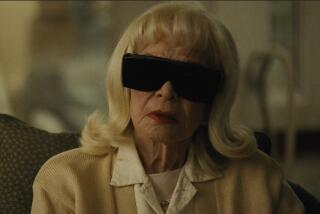All His Women In the Same Living Room : MISS UNDINE’S LIVING ROOM <i> by James Wilcox (Harper & Row Publishers, Inc.: $16.95; 275 pp.) </i>
- Share via
In this pleasantly off-the-wall novel, Wilcox returns to Tula Springs, La., to rework the comic veins explored in his two earlier books, “Modern Baptists” (1983) and “North Gladiola” (1985): fatuity, eccentricity and absurdity. Wilcox’s world is a seemingly bland and banal suburbia whose inhabitants are constantly threatening to slip their tenuous ties to reality and sail off into inner space.
In its complexly plotted orbit, the story revolves around the death of an inconsequential middle-aged home attendant named Ernest Versey, who either fell or was pushed to his death from the apartment of his 91-year-old charge, the feeble, incontinent and semi-senile “mnemonician” L. D. Loraine. Urged on by various people trying to collect the double indemnity from Versey’s life insurance policy, “Uncle L. D.” preposterously claims to have killed Versey, but in a characteristic Wilcoxian twist, it turns out that the suicide/murder dichotomy is a false one. Versey was already dead of a heart attack before his body left the window.
Wilcox skillfully interweaves narrative perspectives. He begins and ends with the viewpoint of Olive Mackie, an aggressive, youngish woman (reminiscent of Carol Burnett’s immortal Eunice) who is vaguely related to L. D. by marriage. She spends much of her time in hot pursuit of election as superintendent of streets, parks and garbage for Tula Springs. Given her edgy gracelessness, the quest seems doomed, but she triumphs unexpectedly by blackmailing the mayor into disqualifying her popular opponent for technical irregularities.
Olive is also busy chasing the fumbling, Chaplinesque, half-Jewish dentist, Dr. Martin Bates, who is involved (mostly platonically) with a lot of women in Tula Springs and serves as another focus of this polycentric tale. Dr. Bates (actually he is still struggling to complete his training at the dental school in Ozone) boards with his mother-in-law, the ubiquitous but elusive Mrs. Undine, who hovers like a deus otiosus above and beyond the adulteries and other passions of her subjects (Bates’ brief affair with Olive, her friend Carol’s long affair with Olive’s husband, Duane, etc.). In the book’s culminating anticlimactic epiphany, Bates is momentarily reunited in Mrs. Undine’s living room with all the women he has loved or who have loved him. Needless to say, nothing really happens, as the characters stand frozen in a Beckettian state of paralysis: “For a few moments there was a terrific silence. Everybody was obviously just dying to leave, but for some reason no one could make a move. The living room, crammed with suitcases, books, overstuffed A&P; bags, deep-sea fishing tackle, cassettes, a leather jacket, an ivory elephant, Mr. Undine holding a bass, wilted chrysanthemums, hair mousse, coffee, Hermes cologne, a corkscrew, a waffle iron, lens solution, a drain guard--this living room would not let them go.”
Life is more or less impossible--too opaque, too thick and too heavy a medium to do anything in. Thus, Olive loves Duane, her sexy-stupid husband. “If necessary, she would throw herself in front of a speeding train for him. But there was no doubt that it was a little difficult being alone with him for any length of time.” Still, nobody finds life harder than the prisoner of memory, L. D. Loraine. Despite his idiot savant speeches on the Battle of New Orleans and the Peace of Ghent, despite his grotesque diet of Vienna sausages and bananas or the electric tape securing the Pampers he wears, L. D. projects a vision of existence both comically futile and terror-stricken. He thrashes wildly in his effort to fight off the inertial plunge from his efficiency apartment over the Sunny Boy Bargain Store to the Azalea Manor nursing home, to inevitable disintegration. Wilcox is too genial to show us the final stage, but beneath the everyday inanities of Tula Springs lies a not-so-quiet desperation.
The ridiculous but baffling questions are everywhere. Why does Kay Undine suddenly reclaim her discarded ex-husband (Dr. Bates)? What was going on between Felix Mackie, Olive’s teen-age son, and the 50-year-old divorced Mormon bishop that made Felix batter the bishop so savagely in a boxing match? What is causing the ominous sinkhole in Mrs. Undine’s backyard? Why does everyone in Tula Springs always talk at cross purposes? (Chekhov would feel at home here.)
For a young writer, Wilcox has amazing assurance and a nearly perfect ear. He is a natural. (“Of course, Duane would murder Olive if he found out about this (her adultery with Dr. Bates). Despite his video games, his home computer, Duane was basically antediluvian and still subscribed to both the Reader’s Digest and the double standard.”) The one gross lapse in Wilcox’s timing comes at the conclusion when, perhaps in a hurry to tie up loose ends, he has Olive solve the mystery of Mr. Versey’s death with too much speed and fluency.
Otherwise, the only question for Wilcox is, where does he go from here? He has created a thoroughly convincing and fully realized micro-universe in Tula Springs, but can he move beyond it? Can he broaden and deepen his register? One hopes so, because right now he looks like one of the most promising fiction writers on the national scene.
More to Read
Sign up for our Book Club newsletter
Get the latest news, events and more from the Los Angeles Times Book Club, and help us get L.A. reading and talking.
You may occasionally receive promotional content from the Los Angeles Times.










